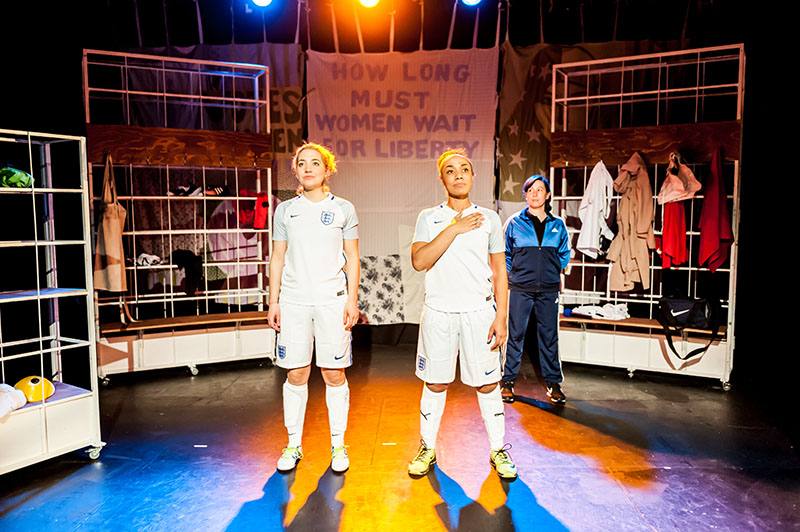Yvonne Arnaud, Guildford – until 10 June 2022
Reviewed by Antonia Hebbert
3***
Playwrights Sabrina Mahfouz and Hollie McNish have an awful lot they want to say. The set gives you a clue to the play’s range – it has modern changing-room shelving set against a background of faded patchwork quilts with Suffragette colours and slogans. Women’s football today and in the past is the basic framework, but mental health, intrusive journalism, racism, coming out, parenting, women getting lumbered with housework, and women winning the right to go to university all jostle for a look-in.
Two young players, Mickey and Keeley, have been picked for training camp with the England women’s squad. When asked who their heroes are, they name Emma Clarke and Lily Parr. Who they? It turns out that Clarke was Britain’s first known black female footballer, playing in the 1890s, and Lily Parr was a top scorer in the 1920s to 1950s. You might not believe that modern players would really name such historic players, but it makes a handy hook for the play, which intersperses scenes from Emma’s and Lily’s lives with those of Keeley and Mickey. Parallels are drawn between the harassment and obstacles that players faced in the past, with the public scrutiny that they face today. Mickey is hiding her romance with another player in the team, and Keeley is trying to protect her mentally fragile mother.
Elizabeth Hope and Charlotte Gosling put in powerful, compelling performances as Keeley/Lily and Mickey/Emma respectively. They do an awful lot of scene-setting and explanation as well as playing their characters, and then have to give us the sense of being in a fast moving football match at a crucial moment. Amy Revelle fills in all the other parts, competently multi-tasking as coach, commentator, referee and various sleazy journalists.
There are some fascinating stories here, for example about the aggression towards early players, the FA’s crushing of the women’s game, and journalists’ obsession with looks rather than skills. You can see why Mahfouz and McNish want to tell them, but the play feels very much a crowded vehicle, rather than a convincing whole. The plotline about Keeley’s mother is presumably meant to be important, but is dealt with so hastily that it doesn’t have much impact. And the fake-foul incident at the end made no sense to me in footballing or dramatic terms.
It’s still an engaging play, with impressive acting. Maybe the teenage girls in the audience felt inspired and empowered, rather than preached at. And it was great to be nudged to look up pioneering women footballers, whose stories are extraordinary. Interestingly, Lily Parr has a National Football Museum Hall of Fame profile, but Emma Clarke doesn’t, although other sites do her justice. Parr had a longer career, but Clarke surely deserves recognition for playing at all in the bonkers social setting of the 1890s. High-heeled boots and bonnets for football, anyone?

